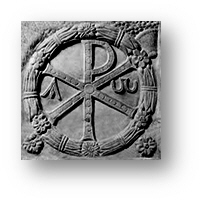
The Fullness of Truth

and the Magisterium of
the Holy Catholic Church
Truth
does not change
The amplitude, however, of what remains
to be understood as definitively true
(that is to say, true in such a way that nothing
— no aspect, no dimension, no further possible
understanding or comprehension of it is possible)
— is presently such that it is conceivable
that more, in fact, can be further predicated
of what we hold to be true. So understood, absolute
truth is always, and in some measure, beyond
the pale of time in which more can be predicated
of it. In other words, the fullness
of truth is inherently eschatological
— it remains to be completely revealed in Jesus
Christ alone — Who is the Way,
the Truth, and the Life (Saint John 14.6)
in Whom, and before Whom, all will be revealed
and nothing will remain hidden. And in this
sense, too, revelation will be complete.
Until such a time, however, it is possible either
to elicit more (analytically) of the truth we
possess, or to acquire further dimensions of
the truth yet to be revealed or understood.
This is not to say that we have no grasp of
truth whatever! It is indefeasibly true that
1+1 will always equal 2. The interior
angles of any possible triangle will always
equal 180 degrees. Such truthful statements
are in the end ultimately tautologous, or redundant:
the definition of a triangle as a three-sided
figure, the sum of whose interiors angles equals
180 degrees, and a figure which is three sided
and whose interior angles equal 180 degrees
is what we understand as a triangle ... are
absolutely identical. To state the one is to
define the other.
Apart from such purely analytical statements
that populate geometry and logic, we never possess
the entirety of truth about
anything existential whatsoever. More can
always be predicated of it — with the sole (logical)
stipulation that what furthermore can
be said of it can be neither inconsistent
with nor contradictory to
it.
This is not to say that what we hold to be true
is inherently defective; what is presently
true will always be true and will never
cease to be true; it is merely incomplete relative
to all truthful statements than can and
will be predicated of it, such that
what is true of it is exhaustively and definitively
stated about it — and nothing further
truthful can be stated relative to it. The
complete truth about any existent
encompasses too many aspects to be exhausted
for the simple reason that its existence in
time will never be totally enacted until
the end of time — and more can predicated
of anything ... than what is predicable of it
at this moment in time and in moments
past.
This does not mean that what is true will ever
cease to be true — we cannot abolish
what is true, nor will what is true ever
be not-true. The totality of the
truth pertaining to anything created
only obtains in that final and definitive denoument
beyond which nothing further can be stated about
it in both time and place. What remains to be
truthfully stated about it is continually explicated
in time — until time itself is no more.
However — and this is vital — truth never
ceases to be the truth and never contradicts
itself: one truth does not abolish
another truth — nor does it contradict a truth
already revealed.
For this reason the Magisterium of the
Church teaches us what the Holy Ghost will lead
us into all truth which is and must be completely
consistent with what has been already revealed.
More remains true to be said than what has already
been said — until the fullness of truth culminates
in the blinding reality of the Parousia,
or the Second Coming of Christ, when this world
will pass away, and all within it. Only then
will the fullness of truth be realized,
for no more could possibly be predicated
of what has reached its culmination in time
and has passed into eternity.
Of one thing we are certain: what the Holy
Ghost will yet reveal to us will not abolish
or contradict what He has already
taught us, revealed to His Church in Holy Scripture
and in the Sacred Deposit of Faith of 2000 years.
Simply put, God, Who is Truth, cannot
possibly contradict Himself.
Editor
Boston Catholic Journal
 Printable PDF Version
Printable PDF Version

Totally
Faithful to the Sacred
Deposit of Faith entrusted to
the Holy See in Rome
“Scio
opera tua ... quia modicum habes
virtutem, et servasti verbum Meum,
nec non negasti Nomen Meum”
“I
know your works ... that you have
but little power, and yet you have
kept My word, and have not denied
My Name.”
(Apocalypse 3.8)
Copyright
© 2004 - 2024 Boston Catholic Journal.
All rights reserved. Unless otherwise
stated, permission is granted by
the Boston Catholic Journal for
the copying and distribution of
the articles and audio files under
the following conditions:
No additions, deletions, or changes
are to be made to the text or audio
files in any way, and the copies
may not be sold for a profit. In
the reproduction, in any format
of any image, graphic, text, or
audio file, attribution must be
given to the Boston Catholic Journal.
|
|